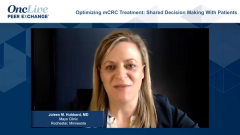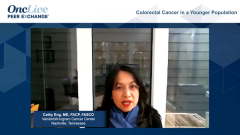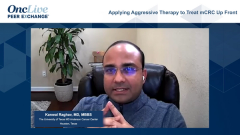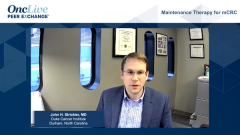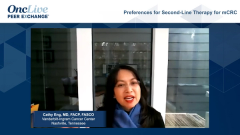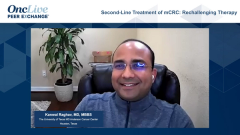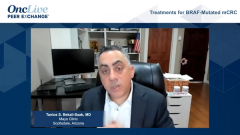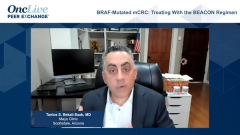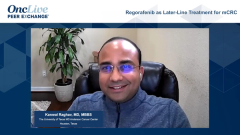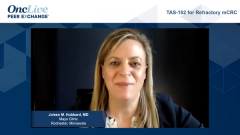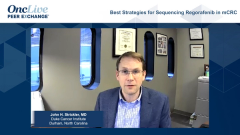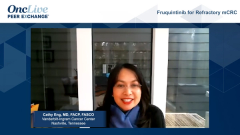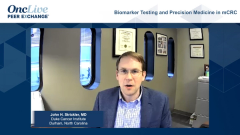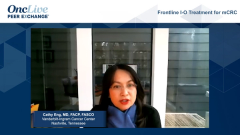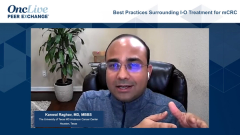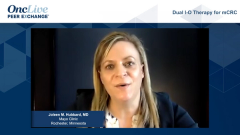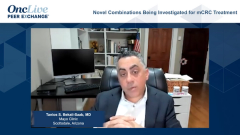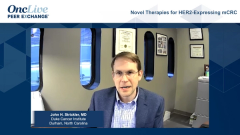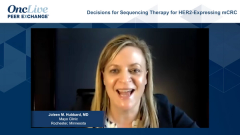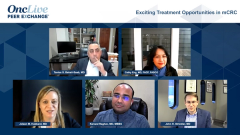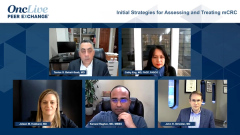
Regorafenib as Later-Line Treatment for mCRC
The rationale for treating metastatic colon cancer with regorafenib in a later-line setting and the importance of applying the dose-escalation strategy demonstrated by the ReDOS trial into clinical practice.
Episodes in this series

Tanios S. Bekaii-Saab, MD: We’ve talked about sequencing, and we’ve talked about the BRAF group. Our patients failed 1 and 2 lines of therapy. We have options available, but it’s always a discussion with the patient at every line of therapy. Where does regorafenib fit in?
Kanwal Raghav, MD, MBBS: We are coming to more of a salvage-line setting, in which we have very limited options. With a usual disclaimer that I feel that clinical trials should be the first thing to be pushed for all these patients, there are definitely soft data, but they’re really strong across different randomized trials. For at least 3 or 4 that we know of, we have seen that progressively the overall survival of these patients are becoming better. This could probably be just because of selection, but it could also be that people are getting better at managing toxicity.
If you look at the overall survival in the CONCUR trial, it was about 6, 6.5, 7.5 months. Some of the data from IMblaze370, which is not exactly a regorafenib comparison—with regorafenib data of almost 9 months of survival—the real-world data showed about 9 months of survival. Clearly, these agents do benefit a small subset of patients in whom they can cause disease control. We were just discussing that response rate is not your end point. We look at a response rate of 2% in this setting, but it’s really not your end point. Even if you’re able to control the disease at this stage, you will get some mileage in overall survival over time.
Clearly, your trial was 1 of the unique trials in cancer medicine, which tried to tell people that you can make a dose reduction, make things stall a little, and still not destroy patients’ outcomes. You don’t have to follow a randomized trial by the book. They are the leaders. Dosing has definitely shown us that you can make these drugs better tolerated, taking more patients through their third and fourth chemotherapy. The longer you treat these patients, you generally will get some mileage in the outcome.
Regorafenib would be a third-line option after you’ve moved through this, barring clinical trials, but with the understanding that we still need to do a lot of work in trying to figure out better biomarkers of who’s better putting up with regorafenib.
Tanios S. Bekaii-Saab, MD: As you’re mentioning ReDOS, the dose-escalation strategy vs the standard 160 mg. It’s going from 80 to 120 to 160 mg on a weekly basis, based on tolerability, which did meet its primary end point on superiority, a better quality of life, better toxicity profile, and even better survival. It actually hit with a survival of 10 months on the dose escalation. Should that dose-escalation strategy now replace the 160 mg in colon cancer? How about replacing that across the board, across cancers?
Cathy Eng, MD, FACP, FASCO: Many of us knew that 160 mg based on the FDA, and a certain base from the original trial is not tolerable for most patients. We’ve all had our first experience with the first regorafenib patient at full dose. I definitely remember my experience with a young patient who had a significant hand skin reaction. I completely agree with you. The work you did with publishing ReDOS is very helpful to many practitioners as well as patients.
Tanios S. Bekaii-Saab, MD: Practical but not necessarily the best or highest level of science. But it’s certainly a practical paper.
Transcript Edited for Clarity


